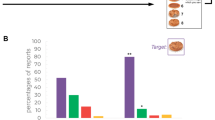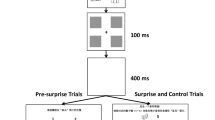Abstract
Attribute amnesia, a phenomenon in which participants fail to report a just-attended attribute in a surprise test, reflects the importance of expectation in determining memory for attended information. To investigate how expectations arise in the context of attribute amnesia, the present study examined whether and how different response histories, independently of task instruction, can shape expectation, thereby driving or eliminating attribute amnesia. Participants were assigned to three groups and completed variations of the attribute amnesia task, where they were initially instructed to encode both target location and identity. Two groups of participants were probed four times on target identity before a critical identity probe, in one case intermittently while in the other case repeatedly during the first few trials. Another group of participants was never probed on identity until the critical trial, which occurred on the 370th trial (after many location probes). The results showed that, in spite of common task instruction, performance on the critical trial depended strongly on response history, with initial identity probes providing some protection against attribute amnesia and intermittent probes completely eliminating it. The findings suggest that the encoding of information into working memory is determined by task experience, independently of task instruction.






Similar content being viewed by others
References
Born, S., Puntiroli, M., Jordan, D., & Kerzel, D. (2019). Saccadic selection does not eliminate attribute amnesia. Journal of Experimental Psychology: Learning, Memory, and Cognition, 45(12), 2165.
Born, S., Jordan, D., & Kerzel, D. (2020). Attribute amnesia can be modulated by foveal presentation and the pre-allocation of endogenous spatial attention. Attention, Perception, & Psychophysics, 82(5), 2302–2314.
Brainard, D. H. (1997). The psychophysics toolbox. Spatial Vision, 10(4), 433–436.
Chen, W., & Howe, P. D. (2017). Attribute amnesia is greatly reduced with novel stimuli. PeerJ, 5, e4016.
Chen, H., & Wyble, B. (2015a). Amnesia for object attributes: Failure to report attended information that had just reached conscious awareness. Psychological Science, 26(2), 203–210.
Chen, H., & Wyble, B. (2015b). The location but not the attributes of visual cues are automatically encoded into working memory. Vision Research, 107, 76–85.
Chen, H., & Wyble, B. (2016). Attribute amnesia reflects a lack of memory consolidation for attended information. Journal of Experimental Psychology: Human Perception and Performance, 42(2), 225.
Chen, H., & Wyble, B. (2018). The neglected contribution of memory encoding in spatial cueing: A new theory of costs and benefits. Psychological review, 125(6), 936.
Chen, H., Swan, G., & Wyble, B. (2016). Prolonged focal attention without binding: Tracking a ball for half a minute without remembering its color. Cognition, 147, 144–148.
Chen, H., Yu, J., Fu, Y., Zhu, P., Li, W., Zhou, J., & Shen, M. (2019a). Does attribute amnesia occur with the presentation of complex, meaningful stimuli? The answer is, “it depends.” Memory & Cognition, 47(6), 1133–1144.
Chen, H., Yan, N., Zhu, P., Wyble, B., Eitam, B., & Shen, M. (2019b). Expecting the unexpected: Violation of expectation shifts strategies toward information exploration. Journal of Experimental Psychology: Human Perception and Performance, 45(4), 513.
Harrison, G. W., Kang, M., & Wilson, D. E. (2021). Remembering more than you can say: Re-examining “amnesia” of attended attributes. Acta Psychologica, 214, 103265.
Howe, P. D. L., & Lee, S. B. W. (2021). Attribute amnesia in the auditory domain. Perception, 50(7), 664–671.
Jiang, Y. V., Shupe, J. M., Swallow, K. M., & Tan, D. H. (2016). Memory for recently accessed visual attributes. Journal of Experimental Psychology: Learning, Memory, and Cognition, 42(8), 1331.
Lamme, V. A. (2004). Separate neural definitions of visual consciousness and visual attention; a case for phenomenal awareness. Neural networks, 17(5–6), 861–872.
McCormick-Huhn, J. M., Chen, H., Wyble, B. P., & Dennis, N. A. (2018). Using attribute amnesia to test the limits of hyper-binding and associative deficits in working memory. Psychology and Aging, 33(1), 165.
Monsell, S. (2003). Task switching. Trends in Cognitive Sciences, 7(3), 134–140.
O’Donnell, R. E., & Wyble, B. (2023). Slipping through the cracks: The peril of unexpected interruption on the contents of working memory. Journal of Experimental Psychology: Learning, Memory, and Cognition, 49, 990–1003.
Simons, D. J., & Chabris, C. F. (2011). What people believe about how memory works: A representative survey of the US population. PloS one, 6(8), e22757.
Swan, G., Wyble, B., & Chen, H. (2017). Working memory representations persist in the face of unexpected task alterations. Attention, Perception, & Psychophysics, 79(5), 1408–1414.
Tam, J., & Wyble, B. (2023). Location has a privilege, but it is limited: Evidence from probing task-irrelevant location. Journal of Experimental Psychology: Learning, Memory, and Cognition, 49(7), 1051
Tam, J., Mugno, M. K., O’Donnell, R. E., & Wyble, B. (2021). And like that, they were gone: A failure to remember recently attended unique faces. Psychonomic Bulletin & Review, 28(6), 2027–2034.
Wang, R., Fu, Y., Chen, L., Chen, Y., Zhou, J., & Chen, H. (2021). Consciousness can overflow report: Novel evidence from attribute amnesia of a single stimulus. Consciousness and Cognition, 87, 103052.
Zivony, A., & Eimer, M. (2022). Expectation-based blindness: Predictions about object categories gate awareness of focally attended objects. Psychonomic Bulletin & Review, 29(5), 1879–1889.
Author information
Authors and Affiliations
Corresponding author
Additional information
Publisher's Note
Springer Nature remains neutral with regard to jurisdictional claims in published maps and institutional affiliations.
Open practices statement
The experiments reported in this article were not formally preregistered. Neither the data nor the materials have been made available on a permanent third-party archive; requests for the data or materials can be sent via email to the corresponding author at brian.anderson@tamu.edu or lead author at yanniya@tamu.edu.
Rights and permissions
Springer Nature or its licensor (e.g. a society or other partner) holds exclusive rights to this article under a publishing agreement with the author(s) or other rightsholder(s); author self-archiving of the accepted manuscript version of this article is solely governed by the terms of such publishing agreement and applicable law.
About this article
Cite this article
Yan, N., Anderson, B.A. Attribute amnesia as a product of experience-dependent encoding. Psychon Bull Rev 31, 772–780 (2024). https://doi.org/10.3758/s13423-023-02379-y
Accepted:
Published:
Issue Date:
DOI: https://doi.org/10.3758/s13423-023-02379-y




